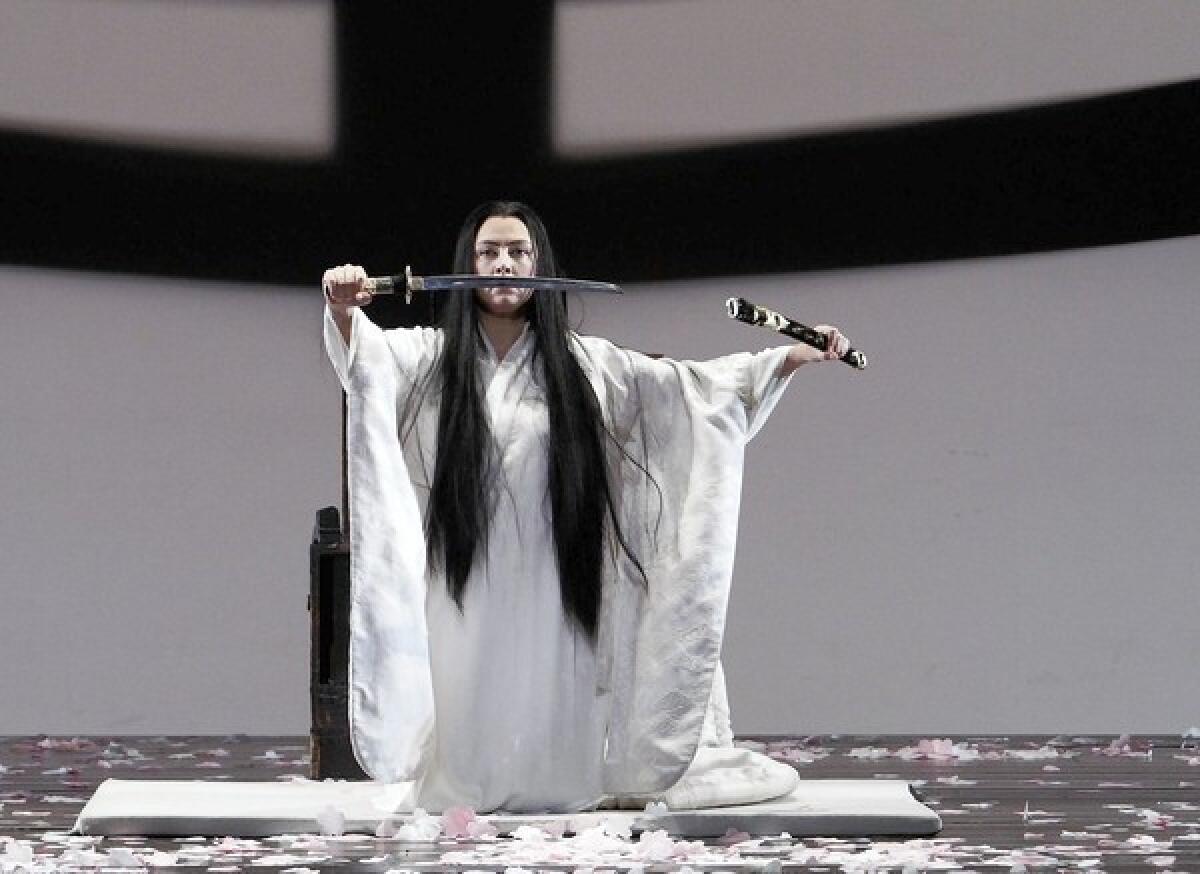Review: Some bright spots in a lesser ‘Madame Butterfly’

- Share via
Between 2004 and 2008, Los Angeles Opera was home to the most beautiful “Madame Butterfly” in America. But it was no doubt time to retire Robert Wilson’s glowing, ascetic, stylized production, already 11 years old when it first arrived here from Paris and requiring enormous care to present properly.
During that same period, San Francisco Opera mounted a more commonplace — and when it came to lighting and movement, sloppier — staging of Puccini’s ever-present opera. This “Butterfly” has flown south. That “new” (as in new to L.A. Opera) production opened at the Dorothy Chandler Pavilion on Saturday night.
Actually, the Bay Area “Butterfly,” with a set that consists of sliding shoji screens, is nearly as old as Wilson’s. Its origins come from San Francisco Opera’s onetime attempts to produce a more theatrically intimate, Broadway-style opera outside of the opera house. But when fitted for the large Chandler stage, those movable screens seemed Cinemascope size, and whatever slight dramatic edge Ron Daniels’ original production at San Francisco’s Golden Gate Theatre in 1997 may have had was now a distant memory.
“Oversized” was the watchword at the Chandler. And over-sung. Michael Yeargan’s set is pleasantly minimal — if as much in an Ikea way as a Japanese one — but it lacks the reflective surfaces that the acoustically challenged Chandler requires. A cast with mainly big voices strove to make them even bigger, and in so doing, singers found themselves falling back on formulaic acting rather than worrying terribly much about characterization.
So let’s start with what worked, namely Grant Gershon’s conducting. The orchestra sounded terrific, despite a bass drum peculiarly placed in a corner of the pit where it boomed with subwoofer-like explosive power. Even so, the company’s resident conductor illuminated intriguing instrumental details (“orientalism” encouraged experimentation in Puccini) and giving them a theatrical life of clarity and vigor.
Gershon also attempted the delicate balance of offering the singers generous support while keeping the performance moving along. In the title role, Ukrainian soprano Oksana Dyka required the heaviest lifting. Her Cio-Cio-San was indelicate, neither youthful nor elegantly Japanese.
PHOTOS: Arts and culture by The Times
Dyka made her company debut last year in Tchaikovsky’s “Eugene Onegin,” in which she had the opportunity to pour forth passion, and she did so again, whether called for or not. Not surprisingly, she went for big effect in “Butterfly” and proved a far more effective depressive than a teen in love. Her hara-kiri (the sword clumsily missing her throat by a number of inches) was hardly convincing. Her giving every word maximum resonance was.
Brandon Jovanovich, who had appeared in the San Francisco production in 2006, was a clarion Pinkerton. But there was no hint of sensual chemistry — let alone erotic attraction — between the lovers, who went through the emotions with stock operatic gestures instead.
Eric Owens, as the American consul Sharpless, who tries to temper Pinkerton’s brash and insincere marriage to the impressionable girlish geisha, was more intriguing. Unlike many baritones who play the sympathy card, Owens retained a near Zen-like calm and sang with a composed reserve, making him seem more Japanese than the overeager Japanese characters in this production. That was a brilliant touch. And it was also quite a contrast from his last L.A. Opera appearance, in which he starred as the monster in Elliot Goldenthal’s “Grendel.”
Milena Kitic was a pushy, tough Suzuki, Cio-Cio-San’s servant. Rodell Rosel made the most of the marriage broker Goro’s machinations. Stefan Szkafarowsky was a murderously angry Bonze, Cio-Cio-San’s uncle who opposes his niece’s marriage to a Westerner. Museop Kim as Cio-Cio San’s suitor and D’Ana Lombard as Kate, Pinkerton’s American wife, handled their small parts with grace. Garret Chang was the boy Trouble, a silent role.
The production is dedicated to Steven D. Rountree, who became chief operating officer of L.A. Opera in 2008 (a month after the last performance of the Wilson “Butterfly”) and who stepped down in September while continuing on as president and chief executive of the Music Center. He is credited with helping turn around L.A. Opera’s finances.
Perhaps this lackluster “Butterfly” is a necessary step back, a preparation for two steps forward. Signing on now, before it becomes too late, for the widely acclaimed touring production of Philip Glass’ and Robert Wilson’s “Einstein on the Beach” would be one way to signal that the company has not lost ambition and become as irrelevant as the current “Butterfly” could make it seem.
MORE
INTERACTIVE: Christopher Hawthorne’s On the Boulevards
TIMELINE: John Cage’s Los Angeles
PHOTOS: Arts and culture in pictures
More to Read
The biggest entertainment stories
Get our big stories about Hollywood, film, television, music, arts, culture and more right in your inbox as soon as they publish.
You may occasionally receive promotional content from the Los Angeles Times.











